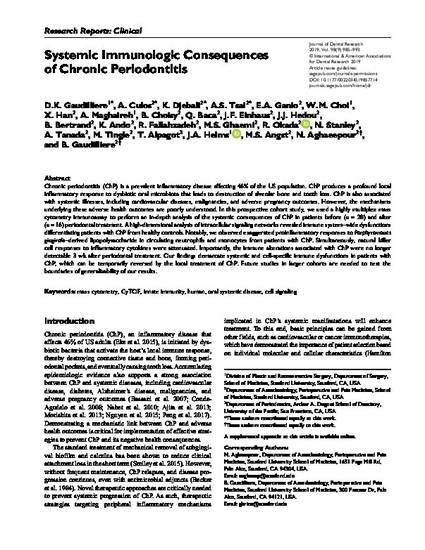
Chronic periodontitis (ChP) is a prevalent inflammatory disease affecting 46% of the US population. ChP produces a profound local inflammatory response to dysbiotic oral microbiota that leads to destruction of alveolar bone and tooth loss. ChP is also associated with systemic illnesses, including cardiovascular diseases, malignancies, and adverse pregnancy outcomes. However, the mechanisms underlying these adverse health outcomes are poorly understood. In this prospective cohort study, we used a highly multiplex mass cytometry immunoassay to perform an in-depth analysis of the systemic consequences of ChP in patients before (n = 28) and after (n = 16) periodontal treatment. A high-dimensional analysis of intracellular signaling networks revealed immune system–wide dysfunctions differentiating patients with ChP from healthy controls. Notably, we observed exaggerated proinflammatory responses to Porphyromonas gingivalis–derived lipopolysaccharide in circulating neutrophils and monocytes from patients with ChP. Simultaneously, natural killer cell responses to inflammatory cytokines were attenuated. Importantly, the immune alterations associated with ChP were no longer detectable 3 wk after periodontal treatment. Our findings demarcate systemic and cell-specific immune dysfunctions in patients with ChP, which can be temporarily reversed by the local treatment of ChP. Future studies in larger cohorts are needed to test the boundaries of generalizability of our results.
Available at: http://works.bepress.com/xiaoyuan-han/47/
